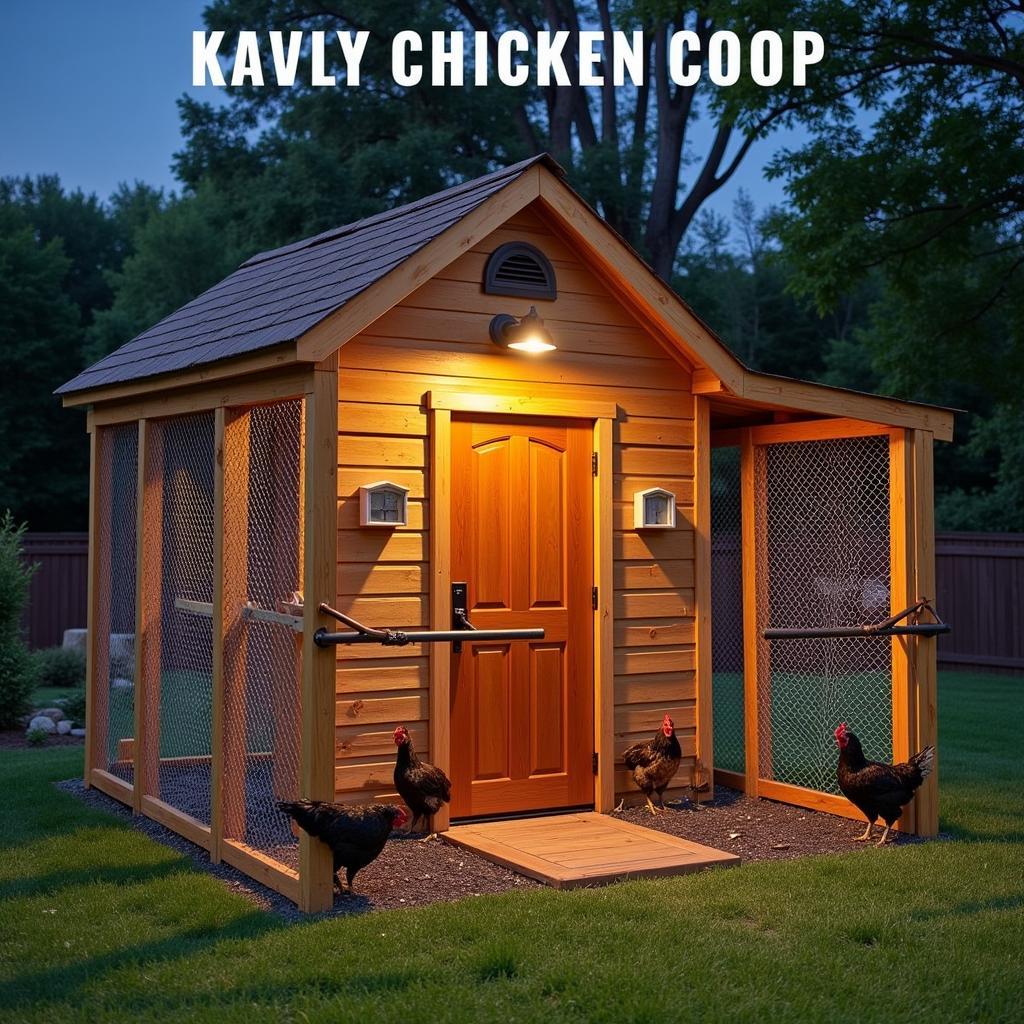You carefully usher your flock toward their coop as the sun sets, anticipating a smooth transition into their nighttime routine. But instead of willingly entering, your chickens hesitate, squawk, and scatter. Sound familiar? The struggle to get chickens inside at night is a common one, but understanding the reasons behind this behavior can help you regain control of your evening coop closure.
Why Won’t My Chickens Go in the Coop?
There are several reasons why your chickens might be protesting their cozy coop at night. Let’s explore some of the most frequent culprits:
1. Fear and Predators
Chickens are prey animals, hardwired to be alert for danger, especially as darkness descends. The presence of predators like foxes, raccoons, or even stray cats can instill fear in your flock, making them hesitant to enter what they perceive as a vulnerable enclosure.
Signs of Predators:
- Chickens huddled together, exhibiting anxious behavior
- Increased vocalizations, especially alarm calls
- Feathers scattered around the coop
- Evidence of digging or attempts to enter the coop from the outside
 Signs of Predators near Chicken Coop
Signs of Predators near Chicken Coop
2. Coop Conditions
A cramped, dirty, or poorly ventilated coop can deter chickens from entering. Imagine being forced to spend the night in an uncomfortable, stuffy room!
Unfavorable Coop Conditions:
- Overcrowding: Insufficient space can lead to stress, fighting, and reluctance to enter the coop.
- Poor Ventilation: Inadequate airflow results in a build-up of ammonia from droppings, creating an unpleasant and potentially harmful environment.
- Parasites: Mites, lice, and other pests can infest coops, causing discomfort and making chickens unwilling to stay inside.
3. Illness or Injury
A sick or injured chicken may be less active and more inclined to isolate itself. If a chicken is experiencing pain or discomfort, it may avoid the coop, associating it with their discomfort.
Signs of Illness:
- Lethargy and decreased appetite
- Ruffled feathers and withdrawn demeanor
- Changes in droppings, such as diarrhea or blood
- Respiratory issues like coughing or sneezing
4. Change in Routine
Chickens thrive on routine. Any disruptions to their established schedule, such as a change in feeding time or a new coop location, can lead to confusion and resistance.
5. They’re Simply Not Ready!
Sometimes, chickens are simply enjoying their time foraging and exploring and aren’t ready to call it a night. Just like us, they have their preferences and might need a little encouragement to head indoors.
Tips to Get Your Chickens Inside at Night
Now that we’ve identified potential reasons for coop avoidance, let’s discuss effective solutions:
1. Ensure a Predator-Proof Coop
- Secure the Perimeter: Use sturdy fencing, hardware cloth, and motion-activated lights to deter nocturnal visitors.
- Reinforce Entry Points: Install strong latches and locks on coop doors and windows.
- Provide Roosting Bars: Elevated roosting bars offer chickens a sense of security while they sleep.
 A Secure and Safe Chicken Coop at Night
A Secure and Safe Chicken Coop at Night
2. Create a Welcoming Coop Environment
- Regular Cleaning: Clean the coop regularly, removing droppings, replacing bedding, and refreshing waterers and feeders.
- Optimal Ventilation: Ensure adequate airflow to prevent ammonia buildup.
- Spacious Design: Provide ample space for your flock to move around comfortably. A good rule of thumb is 2-3 square feet per chicken inside the coop and 8-10 square feet per chicken in an outdoor run.
3. Establish a Consistent Routine
- Regular Feeding Times: Feed your chickens at the same time each day, with the last feeding occurring close to dusk.
- Gradual Coop Acclimation: If introducing a new coop, allow your chickens time to adjust by gradually spending more time inside.
- Positive Reinforcement: Use treats or kind words to encourage chickens to enter the coop willingly.
4. Address Health Concerns
- Isolate Sick Chickens: Separate any chickens displaying signs of illness or injury from the flock to prevent the spread of disease and provide individual care.
- Consult a Veterinarian: If you suspect a health issue, contact a veterinarian experienced in poultry care.
Conclusion
Getting your chickens to go into the coop at night doesn’t have to be a nightly battle. By understanding their natural instincts, addressing their needs, and creating a safe and comfortable environment, you can make coop closure a peaceful end to their day.
FAQs
1. What if my chickens still won’t go into the coop?
If you’ve addressed all potential issues and your chickens are still reluctant to enter the coop, try gently herding them inside with a broom or large piece of cardboard.
2. Can I leave my chickens out at night?
Leaving chickens unsecured at night is not recommended. They are vulnerable to predators and may wander off.
3. How often should I clean my chicken coop?
The frequency of cleaning depends on the flock size and coop design. Aim for at least once a week, more often in hot weather.
4. My chickens are sleeping outside the coop. What should I do?
Investigate the coop for potential issues like overcrowding or parasites. Ensure they feel safe inside.
5. When can I start letting my chickens free-range?
Once your chickens are comfortable with their coop and you’ve established a routine, you can gradually introduce supervised free-ranging during the day.
Need further assistance with your feathered friends? Contact us at Phone Number: 0902476650, Email: [email protected] Or visit us at: 139 Đ. Võ Văn Kiệt, Hoà Long, Bà Rịa, Bà Rịa – Vũng Tàu, Vietnam. Our dedicated customer support team is available 24/7 to assist you.





